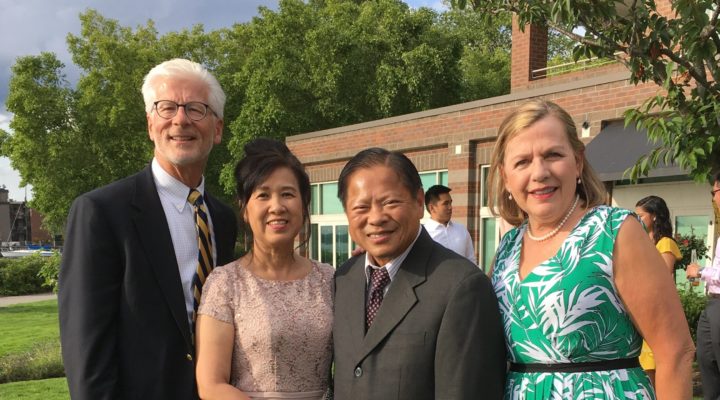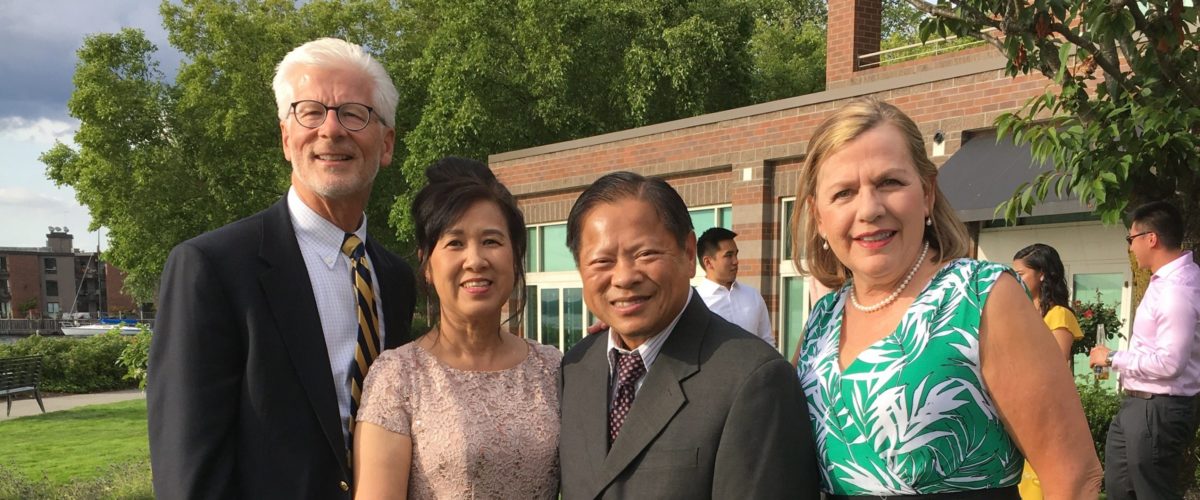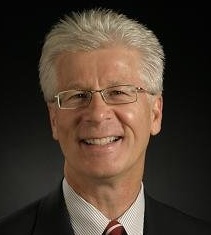 Jittery with anticipation, I skittered down the airport terminal carrying handwritten signs bearing the names “Anh La” and “Xuan La,” a Vietnamese brother and sister arriving from a refugee camp in Malaysia. My wife, Sue Ellen, and I had volunteered to sponsor them.
Jittery with anticipation, I skittered down the airport terminal carrying handwritten signs bearing the names “Anh La” and “Xuan La,” a Vietnamese brother and sister arriving from a refugee camp in Malaysia. My wife, Sue Ellen, and I had volunteered to sponsor them.
That was 40 years ago.
It was 1979, the height of exodus from an uncertain Vietnam, recently reunited into a single country after decades as a slab of meat torn between two growling dogs in a proxy war: first France, then the United States in the south, and China in the north. Fear of assignment to “re-education camps” prompted as many as 2 million South Vietnamese to flee, many of them crowding into unstable boats and casting their fortunes on the waves, making for refugee camps established by exasperated Asian nations and funded by rich western nations.
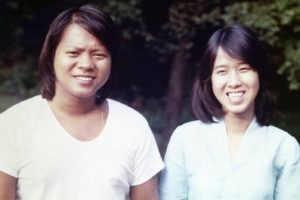
Xuan and Anh La in 1979. (Photos courtesy of Norman Jameson)
Many died – some say half of those who left by sea – from lost and sunken boats, pirates, thirst and hunger from too many days on the water when turned away from refuge destinations.
Anh and Xuan’s courageous parents scrounged up 10 ounces of gold each for passage, never knowing if they would see their children again. After five uncertain days with 195 other refugees packed into a small boat, lost in storms and fired upon by people trying to keep them from shore, Anh and Xuan – just 18 and 20 – made it to Pulau Tengah refugee camp in Malaysia.
Nine months later, when we saw them walking toward us, small and unsure in this overwhelming new world, I held out my hand and said, “Hello, I’m Norman.”
She took my hand, smiled wider and said, “Hello, I’m Anh.”
“Great!” I thought. “She knows English.” But I’d just heard her entire English vocabulary.
“Many died – some say half of those who left by sea.”
I worked for a national denominational news service at the time, and we carried stories about the flood of boat people pouring out of Vietnam and their horrific experiences on the high seas. I was appalled, and moved to do something. When the church we attended declined to sponsor a family, Sue Ellen and I decided to do it ourselves.
I was 26, Sue Ellen 23, and our first-born son was five months old.
Now, 40 years later, I stand white headed under a wedding tent in Kirkland, Washington, my face constricted with emotion, watching Anh and her husband, Phuoc (Bill), walk their daughter Lena down the aisle, past 200 guests, most of them family members who are there in large part because we first sponsored Anh and Xuan. They in turn sponsored their parents and siblings, who married and established families. Three generations cry, smile and take pictures as Lena virtually floats down the aisle.
Under this tent, everyone, except for the three or four non-Asian friends, was there because a sponsor somewhere in their history, changed the course of their lives.
Included and honored all weekend as family, the final thread of our composure unraveled when the bride in her toast, said, “None of this would be possible without Norman and Sue Ellen Jameson who sponsored my mother.” It was an exaggeration, of course. But one we deeply appreciated.
Many Americans knew in 1979 that we had to respond to the humanitarian crisis our country had helped to create. Analogies to today’s humanitarian crisis on America’s southern border are clear. Our economic policies and complicity in regime changes in Central America helped fuel the flames of the great exodus north.
“Everyone, except for the three or four non-Asian friends, was there because a sponsor somewhere in their history, changed the course of their lives.”
History has proven that presidents and presidential candidates prolonged the Vietnam war, believing they needed a crisis to win elections. They built a straw man with the chaff of communism, dominoes, Russian menace, growing Chinese influence, etc., and convinced parents that the blood of their sons was required to drown that threat.
Our current president, sensing vulnerability next November, builds his scarecrow with straws of invasion, drugs, gangs and disease. And he’s convinced many – including his immovable base of white, conservative evangelical Christians – that walls and cages are required to drown the threat.
When the war finally, mercifully ended for the United States, the terror for those in southern Vietnam ratcheted up. And all who could fled.
New friends asked us repeatedly during the wedding weekend what compelled us to sponsor Anh and Xuan. “Compelled” is the right word, and the right question. We were compelled by our faith in Jesus; our commitment to Scripture that commands us to welcome the foreigner, the stranger, the “other”; and our guilt as Americans to do one small something.
We didn’t “choose” Anh and Xuan from a picture book. Our willingness to sponsor coincided with their nine months in a refugee camp, answering the questions, filling out the forms, waiting for a green light indicating that somebody, somewhere in the world was willing to help them restart their lives.
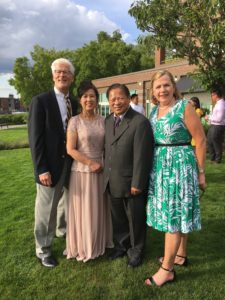
Sue Ellen and Norman Jameson with Anh and Xuan at Anh’s wedding 40 years after sponsoring the siblings as Vietnamese refugees.
Canada, Australia and the U.S. were the main sponsorship destinations, but people in other nations also opened their doors and their hearts.
Within a couple of weeks of living with us, Anh and Xuan were employed in minimum wage jobs in Nashville, had their own apartment and were saving money. They knew written English and quickly put pronunciations to what they had learned in camp. Xuan liked to watch television to learn the language, but quickly grew bored with the programming. He also was openly curious about the girth of so many Americans. “So fat,” he would say, shaking his head.
We used cereal boxes and children’s books to accelerate English learning. We worked with coins and currency, bus maps and lots of conversation. One night we left our son with them while we had a quick date. When we returned home, the kitchen was completely cleaned and dishes put away.
However, the next day when we reached for familiar dishes in their usual place, they were not to be found. When I asked, Anh opened the dishwasher and showed us where she had properly stored them after washing them in the sink and drying them.
Ironically, Lena told us at the wedding gathering that her family still prefers to wash dishes by hand, and, well, the empty dishwasher is a great storage place!
Xuan settled in San Jose, the American city with the highest percentage of Vietnamese people in its population, at just over five percent. That’s where he, in turn, resettled his parents and siblings. Anh and Bill now live near Seattle.
While everyone at the wedding had a sponsor in his or her history, most had lost touch with them, in large part because sponsors typically were older than were Sue Ellen and me, or they weren’t individuals, but groups, such as churches. Our presence reminded each of their own lifeline.
“Tragically, the current generation of Americans acts as if those who would come from the south have nothing to offer.”
As we learned more about this extended family over meals, a tea ceremony, a wedding and reception, we felt with every passing moment more a part of the family. And I noted how “American” they all were. Committed to and appreciative of the United States, they are executives, members of the military, technicians, IT professionals, salespeople, business owners, students. Their families are strong, and their contribution to our society outweighs many times over any cost of resettlement.
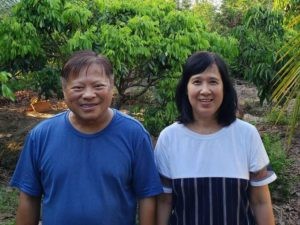
Xuan and Ahn La in Vietnam last year.
Yet tragically, the current generation of Americans acts as if those who would come from the south have nothing to offer.
A generation ago, Anh and Xuan’s plight was desperate and dangerous, their destiny cast into the hands of resentful and suspicious nations, their destination completely unknown.
From the airplane, on her way to America, Anh looked down at the refugee camp below, hoping never to go back, and she started to worry.
“I don’t know nobody in this country and I don’t know who will be my sponsor,” she recently recalled. “So many things in my mind. I looked down and said, ‘What am I doing?’ It’s so scary that we don’t know how our lives end up, what our future. We have no clue about this country, what it look like, what it will be.”
Sue Ellen and I had no clue what sponsorship would look like, what it would be. But I know that we are richer for having done it. And our nation is far richer for having received this Vietnamese sister and brother, now proud American citizens.
Now, as refugees clamor at our southern border, many trying to escape the result of America’s interventionist policies in Central America, our country turns its back, ignoring the clearly documented benefit of opening our arms to receive those who risk death to cast themselves on our mercy.
Such an attitude does not protect us as a nation. Instead, it denies us the benefit of welcoming to live among us those who would eagerly embrace hard work, strong families and vibrant churches – and make us and our communities stronger and better.

